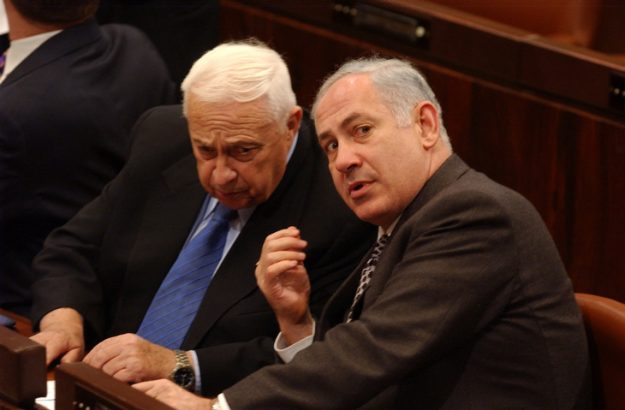The prime minister is using Ariel Sharon’s old playbook to manage multiple crises: keep your hands on the wheel and never be boxed in. But will it be enough to hold his coalition together?
Despite serving assiduously in each other’s cabinets, Ariel Sharon and Benjamin Netanyahu intensely disliked one another. David Landau, author of the superb biography Arik, The Life of Ariel Sharon details how Netanyahu served up a ‘cup of mortification’ for Sharon and publicly ridiculed him during Bibi’s first stint as Prime Minister. Sharon meanwhile described Netanyahu as lacking leadership skills and self-control. As one Likud figure tells Landau, ‘Sharon’s attitude to Bibi was one of contempt and revulsion but it was always blended with admiration and fear.’
It’s unclear to what extent – if any – Netanyahu feels himself to be in Sharon’s (literally and figuratively enormous) shadow. But he used the recent Israel-UAE normalisation agreement to start a PR blitz pushing a narrative that his achievements not only dwarf Sharon’s, but those of all previous leaders since David Ben-Gurion. High on hubris and low on nuance, Netanyahu’s line was that while Begin’s agreement with Egypt was ‘land for peace’, Rabin’s Oslo Accords were ‘terror attacks for peace’ and Sharon’s Gaza disengagement (which Netanyahu voted for) was ‘missiles for peace’, his deal was ‘peace for peace’ and ‘peace through strength’.
Having worked in governmental policy planning for several years, I can attest to the fact no serious policy recommendations are cost free. Good options include opportunities and risk. All involve forms of compromise between (often conflicting) national interests and the geo-strategic or domestic-political reality. All except those in the alternate reality Netanyahu is trying to sell us.
The Prime Minister may not carry a wallet nor own a credit card. But just because he doesn’t pay for Falafel in the shuk or ice cream at his residence doesn’t mean he can convince the public that there’s such a thing as a free lunch. Certainly not in the Middle East.
The truth is that the Abraham Accords were historic enough without the hyperbole. Yet Netanyahu’s ‘peace for peace’ claims seemed even hollower when set against reports that he had suspended plans for West Bank annexation and de-facto closed his eyes to the American sale of F35s to the Emiratis. Netanyahu’s denials fooled no one other than his most loyal followers.
Yet while Netanyahu disparaged Sharon (who was known to like a lunch or two) and his predecessors, he has adopted some of his former rival’s guiding principles.
The first is to always stay in the game come what may. Before being lauded by world leaders for his courage, Sharon suffered from a rollercoaster political career that hit rock bottom with the devastating conclusions of the Kahan Commission after the Lebanon War. Reflecting back, Sharon would say that one should always keep one’s hands on the wheel. ‘At times you are up, at times you are down. But the wheel keeps moving,’ he would recount. Even during his years in the political wilderness, Sharon always believed things could improve. He just had to hold on.
Sharon’s second principle was preventing being forced into what he termed the coralles, the narrow path (without an exit point) that cattle walk down on their way to be slaughtered or bulls stride through towards the deadly battle with the matador. Sharon was constantly concerned about being boxed in, forced by events and international pressure along a path that would lead to his downfall and from which he could not escape. He always strove to keep his options open, to maintain his freedom to manoeuvre.
These two principles explain many of Netanyahu’s recent decisions.
He upgraded Sharon’s first principle by holding tightly onto the ‘Prime Ministerial wheel’. Whether indicted on corruption charges, challenged by Likud rivals, or seemingly unable to scrounge a coalition of 61 Knesset seats after three consecutive elections, Netanyahu continued to hang on for dear life to the Prime Ministerial wheel.
He knew once he let go, he’d be lost.
And whenever he saw himself being boxed in politically, diplomatically or judicially, Netanyahu forced his way out of the corralles. He promised to keep the rotation agreement ‘without tricks or shticks’ but within three months he was energetically plotting an exit strategy. The evidentiary phase of his trial is set for January? He may seek to further delay it. Positions of police commissioner, state attorney and attorney general need to be filled? He’ll try and influence it.
Anything to keep his options open; to not be led down the political path whose final stop is the end of his premiership.
The 1,000, 2,000 and 4,000 dollar question is whether this is still possible.
On the one hand, the centre-left opposition is fractured. And Blue and White’s electoral strength suffered a mortal blow when Benny Gantz and co facilitated Netanyahu staying in Balfour street.
On the other hand, Corona daily cases are rocketing. The economy shows no sign of short-term improvement. Unemployment is remarkably high. Long gone are the days of Netanyahu retweeting reports from dubious think tanks about Israel’s successes or boasting of foreign leaders seeking advice; The evidentiary stage of his trial is due to begin in January and he is yet to secure the (paid) services of a defence lawyer; And the clock is ticking (albeit slowly) towards November 2021 when the rotation agreement with Gantz is due to be implemented.
One more throw of the dice remains – the automatic dissolution of the Knesset in late December following the failure to pass the state budget. It would be a deeply cynical move. But perhaps Netanyahu hopes that – flying on the coattails of his foreign policy success (including a potential ceremony on the White House lawn) – he and his allies can sweep a Knesset majority.
The problem with this option is that these allies who supported Netanyahu through three election cycles may be growing impatient and frustrated with his tricks and shticks. A decision to lockdown some Haredi towns and bar Hasidim wishing to fly to the Ukrainian town of Uman may have fractured the long standing ultra-Orthodox marriage of convenience with the thrice wedded Premier. And suspending annexation has likely lost Netanyahu the support of the pro-settler camp. Indeed, Yamina, unceremoniously dumped from the coalition when they were no longer needed, have vowed to recommend their own leader, Naftali Bennett as Prime Minister at the next election. The removal of either group from Netanyahu’s coalition makes forming a majority near-impossible.
Indeed, it would be deeply ironic if after all of Netanyahu’s political sleights-of-hand, exaggerations and tall tales of peace agreements without compromise, the shattering of the political bloc that kept him in power comes as a result of two perfectly reasonable and responsible decisions – dropping annexation in return for normalisation, and trying to halt the chain of infection during a global pandemic.
Somewhere, in an afterlife the secular Sharon never believed in, perhaps he is enjoying seeing his rival squirm.




































